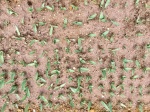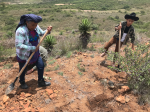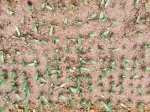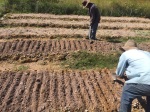Since 2018, Rezpiral has been carrying out one of the project’s central tenets, to share the ecological burden, and responsibility with mezcal producers. In the rainy-season of every year, Rezpiral gifts agave to producer families to repopulate different lands with endemic agave in the name of biodiversity and renewal/paying forward natural resources to future generations.
Agave transplant totals & notes:
2023: 8,700 agave Arroqueño and Mexicano, raised from seed in the vivero of Luis Antonio of San Vicente Coatlan.
This year, Rezpiral has collaborated with mezcalero campesino and school teacher/maestro Luis Antonio Santiago of San Vicente Coatlan who runs an agave nursery where he grows a range of agaves from seed. This year his Arroqueño and Mexicano were of good size, and are also two agave varietals that have been steadily depleting from lands over the recent years.
Alejandrina & Nicolas Hernandez, 1000 Mexicano, 1000 Arroqueño
Berta Vasquez, 700 Mexicano 300 Arroqueño
Leo Hernandez, 1000 Mexicano, 1000 Arroqueño
Abel Martinez, 1700 Arroqueño
To other mezcaleros compliments of Jason Cox/5 Sentidos, 1000 Mexicano, 1000 Arroqueño
2022: 11,000 Tobalá and Espadín were gifted to the following producers from Aureliano Hernandez vivero:
Simeon Ramírez, Abel Martínez, Berta Vasquez, Alejandrina & Nicolas Hernández and to another producer family in Puebla compliments of Jason Cox of Cinco Sentidos.
For years now agave seed from different family producers such as Berta, Reina or Simeon would be germinated and cared for in the Vivero Amigos del Maguey y la Biodiversidad. This year marks the permanent closure of the nursery/project after the municipality decided to take the land back, and in this hump year, while landless and deciding on how to evolve this project’s agave practice, agave was sourced from a nursery built and managed by Aureliano Hernández of San Baltazar Guelevila. Specifically, 11,000
2021: 10,793 agave
transplanting this year ended early due to the Municipality’s unexpected decision to close the nursery. Closed until further notice.
Simeon Ramírez de San Agustín Amatengo, 6370 Arroqueño, Jabalí & Tobala
Leonardo de San Baltazar Guelevila, 1300 Tobala, 100 Arroqueño
Family of Christina and the resting Tío Chico, San Luis Amatlan, 1300 Arroqueño, Tobala, Madrecuish & Jabali
Lalo Perez de Miahuatlan, 473 Tobala y Espadilla (via courtesy/contribution of Jason Cox)
Alejandrina & Nicolas Hernandez, Zoquitlan, 1050 Tobala, 200 Arroqueño
2020: 20,021 agave
Berta Vasquez, 9472 (Tobala, Mexicano, Arroqueño, Tepextate, Espadin)
Simeon Ramirez, 1025 (Mexicano, Arroqueño, Espadin, Madrecuish)
Abel Martinez, 816 (Arroqueño, Espadin, Mexicano)
Aureliano Hernandez, 330 (Arroqueño)
Alberto Martinez, 4963 (Tobala, Espadilla, Sierra Negra, & Espadin) compliments of Jason Cox/5 Sentidos)
Amando Alvarez, 494 Espadilla (compliments of Jason Cox/5 Sentidos)
Atenogenes Garcia, 334 Madrecuish, 200 Espadin (compliments of Jason Cox/5 Sentidos)
Noe, Zoquitlan – 900 (Espadin, Madrecuish, Arroqueño)
2019: 16,000 agave
Berta Vasquez, San Baltazar Chichicapam: 3,877, Espadin, Tobala, Madrecuish, Tobaziche, Tepeztate
Aureliano Hernandez, San Baltazar Guelevila: 7,030 Coyote, Tobala, Espadilla
Simeon & Apolonio Ramirez, San Agustin Amatengo: 890 Tobaziche, Tepeztate, Espadin
Alberto Martinez, Santa Catarina Albarradas, Atenogenes Garcia of San Isidro Guishe (via Jason Paul Cox, Cinco Sentidos): 2,636 Madrecuish & Tobala
Abel Martinez, Santo Domingo Albarradas: 145 Mexicanito
Reina Sanchez, San Luis Amatlan: 450 Tepeztate
El Municipio de Santa Maria del Tule: 935 Tobala
Carmen Vasquez, Miahuatlan: 200 Karwinski
August 5, 2022 – This year marked the permanent closure of the nursery “Vivero Amigos del Maguey y Biodiversidad” in El Tule after the municipality decided to take the land back. And so in this hump year, the practice of gifting agave continued via sourcing them from a nursery built and managed by Aureliano Hernández of San Baltazar Guelevila. 11,000 Tobalá and Espadín were gifted to the following producers:
Simeon Ramírez, Abel Martínez, Berta Vasquez, Alejandrina & Nicolas Hernández and to another producer family in Puebla compliments of Jason Cox of Cinco Sentidos.
EL VIVERO AMIGOS DEL MAGUEY Y LA BIODIVERSIDAD (2018-2021)
2018 – First year of nursery
2021 – Agave is the Future: Reflecting on 4 years of the Vivero
Vivero Diary – Oct 29, 2020
In our ongoing vivero space & practice in municipal land in Santa Maria del Tule, we raise, care for and ultimately gift cycles of agave to families for transplant. We seek out especially endemic varietals, and raise all agave from seed, weeding them by hand and maintaining them with composts, river silt, and migro-organism teas. We also seek out smaller producers who may not have their own reserves of agave or who can especially benefit from support in starting a transplanting practice.
We are also regenerating the site for the local municipality – slowly rebuilding the soil health and ecological biodiversity in the site through the use of natural ecological processes and traditional pre-hispanic technologies; controlled burning, milpa growing and utilizing purely organic inputs & micro organisms (zero pesticides/herbicides or industrial agents).
The evolution of our vivero is to further understand and mezcal, which in its craft form and scale is not a monoculture but instead a seasonal practice that fits into a large diversity of foods and drinks. To fully embrace this ethos and stand by these words, our vivero should also be a food and drink garden of bio-diversity.
We are working to bring the site back from the grips and death of monoculture (sounds dramatic, and it is).
A farming modernization program occupied the site for many years and left the soils and site desertified after repetitive intensive chemical and tilling practices.
Agave Transplant Mission
Foundation of the vivero’s efforts to conserve and reforest natural resources in the pueblos and families with whom we work are:
- To support independent, small-scale mezcaleros in planting and sustaining their own sources of agave. Even the most well-planning mezcalero families are typically forced to buy agave from sources, and this puts small scale producers at risk and vulnerable to monopolistic behaviors of others.
- To share the responsibility of sustaining populations of endemic agave and the production of agave, which our products take from.



















































